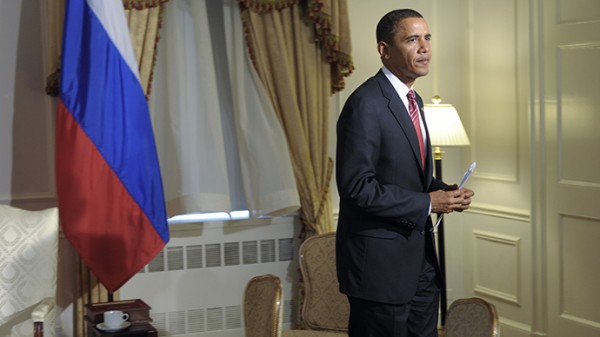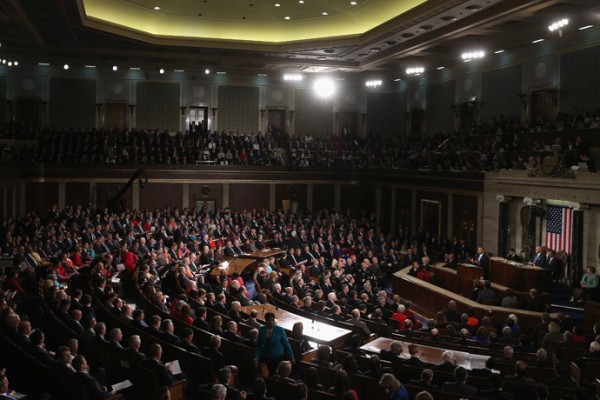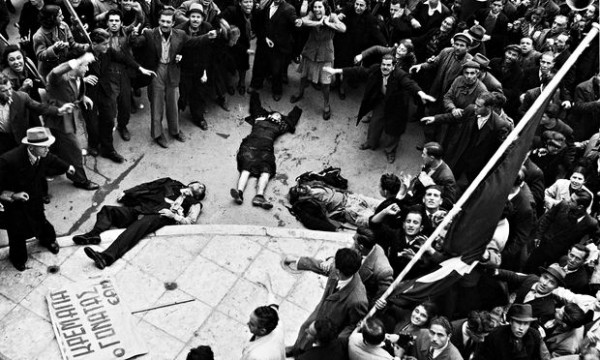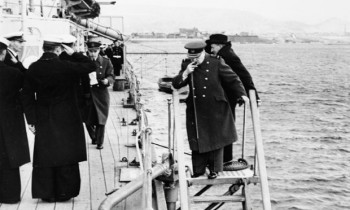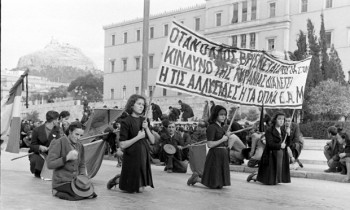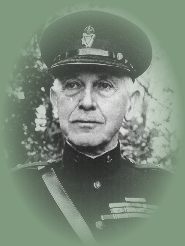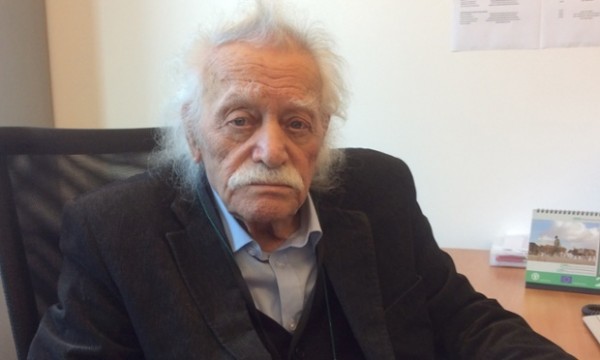Primetime torture: exploring how Hollywood tackles this “delicate” subject

Marines administering the “water cure” to a filipino rebel in 1901. US imperial atrocities are old. The practice had been introduced by the Spaniards and other older imperialists.
http://www.primetimetorture.org
http://www.humanrightsfirst.org
Eleven Reasons I’m Ashamed to Be an American

Former CIA boss George Tenet lying and bullying CBS’ Scott Pelley. “It’s the life we chose, Michael.”
[dropcap]I’m going to say it:[/dropcap] I am ashamed to be a US citizen. This doesn’t come easily, because having lived abroad and seen some pretty nasty places in my time, I know there are a lot of great things about this country, and a lot of great people who live here, but lately, I’ve reached the conclusion that the US is a sick and twisted country, in which the bad far outweighs the good.
I can remember first feeling revolted about my country several times. The first was when I realized, at the tender age of 17, what an atrocity the US was committing against the people of Vietnam in my name — the rape and murderous destruction of peasant villages and the napalming of children in the South, and the carpet bombing of North Vietnam (including dikes, schools and hospitals). Later, I was shocked and revolted when I belatedly learned how my country had rounded up native born and naturalized Japanese-Americans and Japanese legal residents into concentration camps during WWII, and how the national government had been complicit in the taking of those vilely incarcerated people’s farms, homes and businesses by conniving white fascists in California.
But those crimes, horrific as they were, pale in the face of what I see this country doing now.
Let me count some of the ways that this country makes me sick:
1. It’s not just the latest release of a heavily redacted report on the Bush/Cheney administration’s deliberate program of torture, launched in 2001 in the wake of 9-11, and carried on for years against not just alleged terrorists, but even against people known or suspected to be completely innocent of anything. It’s that nothing has been done, or likely will be done, to punish those who authorized and advocated for these war crimes and crimes against humanity. And it’s not just that, but that so many of my fellow Americans are okay with that. Even in the media, including on NPR, I hear reporters saying that one of the “questions” about the government’s torture program is whether it “worked” or not in obtaining information about acts of terrorism. Because it doesn’t matter whether torture “worked” or not. The US and the rest of the nations of the world signed a treaty after World War II saying that torture is a criminal act (the penalty includes death under international law!). And so is covering up or failing to punish the crime of torture.
We’re plenty fed up, too. And we should add to this list that it’s hard to live in a country where most people go around like zombies happily ensconced in a cocoon of mass disinformation, frivolous distractions, and puerile self-absorption, while the planet falls to pieces.
2. The police in the United States have become so militarized in both a physical sense and in terms of their training and self-image, that they are now more of an army of occupation than “peace officers” (there’s an anachronistic term you don’t even hear used anymore). Over and over we see police aggressively using force, including deadly force, in situations that call for calm and understanding. The most sickening thing to me, was watching a squad car in Cleveland race directly onto a park lawn right up to an enclosed gazebo where 12-year-old Tamir Rice was sitting, alone, playing with a toy gun. In less than two seconds, one of the cops exits the car and shoots the boy fatally in the stomach. There was absolutely no call for this execution. No one was around being threatened by the kid. The cops should have pulled up safely at a distance, assessed the situation, and then called on Rice to exit the gazebo and drop the gun, even if they feared it was real. Or they should have ordered him to stay put and drop the gun, and then, if he didn’t comply, waited for back up, including a trained negotiator. Instead, they just raced in like it was a hostage rescue attempt, and blew a little kid away. Then they did nothing to help him after shooting him. Ugh! And yet, there is not a wave of universal outrage over this monstrous police murder.
Nor is there universal outrage at the cops involved in the execution slaying of Michael Brown in Ferguson, MO or in the completely pointless choking death of Eric Garner in Staten Island, New York, both of whose uniformed killers were exonerated by grossly manipulated and misled grand juries. Instead, we hear whites interviewed on TV shows saying that the cops did the right thing.
3. But that’s just part of it. I’m disgusted by having as our president a man who lacks the intestinal fortitude to call out these above crimes and to insist that he will prosecute those who ordered the military and the CIA to use torture on captives in the so-called War on Terror. President Obama should be demanding that his so-called Justice Department aggressively prosecute those cops who are killing unarmed civilians if local prosecutors won’t do it, and he should be ordering the prosecution of everyone who ordered, authorized, enabled or covered up torture by US government agents. (No wonder President Obama has been diagnosed with acid reflux: at least the man’s alimentary canal appears to have a conscience!)
4. I’m disgusted that according to the Prison Policy Initiative, the US has at any given moment some 2.4 million people locked up (only two-thirds of whom have even been convicted of a crime, with most of the rest awaiting trial because they can’t post the excessive bail set by our corrupt court system). And no wonder: Just between the late ‘80s and 2008, the number of federal laws for which someone can end up being jailed has soared from 3000 to 4450, and it keeps rising as charlatans in Congress keep passing laws to create ever more “crimes” to punish. And that doesn’t count state and local governments, which explains why the US, with 5% of the world’s population, accounts for 25% of the world’s prison inmates. Myself, I was threatened with jail not long ago by a thug cop in a neighboring town for hitch-hiking — an activity that actually is legal in my state, and that, if done improperly, is at most a citation offense like a parking violation calling for a ticket, not an arrest. No matter — if I hadn’t put down my thumb, this bully in a uniform with sidearm would have cuffed me, and trumped up something: resisting arrest, disturbing the peace or some such tripe. We live in a punishment-obsessed society, overseen by cops who seem to derive pleasure in lording it over the public.
5. I’m sickened to see community after community pass laws making it illegal to feed the homeless. This in a country where in the wake of the Great Recession, we still have a real unemployment and underemployment rate of between 18% and 20% depending on how you’re counting.
6. I’m ashamed and angry that Wall Street is essentially one gigantic crime scene — the place where trillions of dollars of wealth over the last decade has been siphoned out of the pockets of ordinary Americans into the hands of the wealthiest 1% or 5%, making this now the most unequal society among the 34 developed nations of the world. Not one leading banker from the nation’s top so-called too-big-to-fail banks has even been charged with a crime, much less convicted and jailed for the biggest swindle the world has ever seen. On those rare occasions when the Justice Department has gone after some of these bankster crimes, it has reached “settlements” in the form of meaningless fines, and hasn’t even, as part of the deal, required any of these crooked executives to leave their lucrative positions of power, or even to admit wrongdoing. In fact, these crooks in pinstripes instead of jail stripes are regularly invited guests at the White House and Congress, called upon to give their “wisdom” on points of government policy, for which they then reward their hosts generously with perks and “campaign contributions” that are little more than bribes.
7. I’m outraged and ashamed that my country spends well over $1 trillion a year on its military, and has military personnel based in over 800 locations around the globe. This at a time when 50 million Americans are reportedly “food insecure” — another way of saying that 50 million people, many of them children, go hungry at some point in the year — and when support programs like Food Stamps and Unemployment Compensation are being cut to save money. Worse yet, there is no national scandal over this. In fact, many Americans, perhaps a majority, think that all that spending on the military is a good thing, because it supposedly “keeps us safe” and maybe “creates jobs.” The sad truth is that today, the US, my country, is the world’s largest terrorist state — based objectively on its recent unrivaled history of illegally invading other lands, conducting drone killings across borders, kidnapping, torturing and disappearing people, and funding and assisting in the overthrow of foreign, often democratically elected, governments.
8. I’m sick at heart because half a century after the Freedom Riders and courageous local people won an end to Jim Crow laws in the South that had for generations kept black people from voting, at least half the country, and not just in the south but everywhere, are now trying to make it hard or impossible for blacks, hispanics and other people of color to vote. And our corrupted court system is backing them in many cases, right up to the US Supreme Court, which is now dominated by fascists, proto-fascists, and religio-fascists.
9. I’m embarrassed that my fellow Americans, by and large, care more about whether they can get the latest iPhone, or whether they have a god-given right to own an unlicensed automatic weapon, than about whether we still have a right to privacy, a right not to be spied on by the government, or whether corporations should be allowed, as now under Citizens United, to buy government officials directly, like sides of beef.
10. I’m disgusted that my countrymen and women no longer believe it is important for society to provide everyone with the basic services that allow all people a fair shot at climbing out of poverty. There is no longer a sense that everyone should be able to attend a decently funded public school, or have access to a tax-funded state college for free or for a small tuition — the kind that could be covered with a 10-hour work-study job. There is no longer any sense that all Americans should be entitled to quality health care. Even what support there is for the so-called Affordable Care Act, far from being about making quality care available for all, is mostly from individuals who selfishly want to be able to afford insurance for themselves. It’s not about making it available to all. It’s like, if the ACA enables you to afford insurance, you’re for it, but it you have employer-provided insurance, you’re against it. This is basically true in every area. Americans today have lost any communal sense of shared responsibility and shared struggle. People used to talk (incorrectly, I think) about the ‘60s generation being the “me” generation. Actually, it’s pretty much the entire US that has become a “me” country.
11. Finally, I can’t forget the issue of climate change. The US has unquestionably been the primary contributor to climate change over the last century, as the most industrialized nation in the world. Even today, as it’s carbon emissions are surpassed by China, the undeniable fact is that on a per capita basis, we Americans dump far more carbon into the atmosphere per person than anyone in China, by a factor of five or more. Yet our country has been a primary obstacle to any real efforts to slow or reverse climate change. The US, during this administration and the last, has actively subverted efforts to reach international agreements to limit greenhouse gases, even using the National Security Agency’s spying abilities to monitor other countries’ negotiation positons and to blackmail leaders. It is simply sickening too, how the selfishness of Americans even extends to caring not a whit about the horrors that will be faced by not just our grandchildren, but even our children (the World Bank, no environmental radical hotbed, warns that today’s teens will face a world that is a staggering 6-8 degrees Fahrenheit hotter by the time they are 80!). This is selfishness — or — madness on a scale that is to me incomprehensible.
I could go on, but I think eleven reasons to be ashamed of one’s country ought to be more than enough.
It is for me.
ABOUT THE AUTHOR
Dave Lindorff is a founding member of ThisCantBeHappening!, an online newspaper collective, and is a contributor to Hopeless: Barack Obama and the Politics of Illusion (AK Press).
BE PART OF THIS COLOSSAL INFORMATION WAR. THEIR LIES. OUR TRUTH. WORLD WARS AND HUGE ISSUES ARE BEING DECIDED.
It’s a battle of communications we can’t afford to lose.
If you took the time to read this article, and found it worth SHARING, then why not sign up with our special bulletin to be included in our future distributions? And please tell others about The Greanville Post. If you don’t, how can we ever neutralize the power to deceive of the corporate media?
YOUR SUBSCRIPTIONS (SIGNUPS TO THE GREANVILLE POST BULLETIN) ARE COMPLETELY FREE, ALWAYS. AND WE DO NOT SELL OR RENT OUR EMAIL ADDRESS DATABASES—EVER. That’s a guarantee.
America tuned out as Congress bangs war drum against Russia
Robert Bridge
[dropcap]On December 4[/dropcap] as America was tuned into Thursday night football, or staring into the cold depths of the refrigerator at commercial time, House members brought the nation one step closer to all-out war with Russia.
Future historians – that is, assuming there are humans still around to contemplate history – may one day point to House Resolution 758 (a full critique of this vile act of Congress is included in our Appendix, written by none other than a card-carrying Libertarian, and originally published on LewRockewell.com) as the single piece of legislation that sparked a global conflagration between two leading nuclear powers.
This is not hyperbole. US rhetoric against Russia is quickly overstepping reality, causing US politicians to endorse policies that severely inflate the perceived threat. When political veteran Ron Paul says the House passed what he ranked as “one of the worst pieces of legislation ever,” well, we had better sit up and switch off CNN, especially when that legislation happens to involve a historical heavyweight like Russia.
Resolution 758 was forged in a political furnace of unbalanced, one-sided debate, where American politicians regularly attempt to outdo each other in a lame contest called ‘Russian fear mongering.’ This popular game, which is never out of season, is played among intellectually challenged officials looking for quick political advantage; a bit like Special Olympics for American politicians where everybody goes home a winner.
However, these Russian games are no longer a laughing matter as they were during the feel-good Yeltsin era. Vladimir Putin has shown himself to be a highly competent statesman and whether this fact is responsible for America’s bad mood is difficult to say. Whatever the case may be, judging by the wording of HR 758, America seems to be sliding inexorably towards a ‘war footing’ with Russia.
The opening paragraph of HR 758 accuses Russia of conducting an “invasion of Ukraine” and violating its territorial sovereignty. Like so much else in this resolution, the statement is delivered into American living rooms like a dry, cold pizza without the toppings. Yet nobody, except Ron Paul and a few others, seems to be complaining.
“Surely with our sophisticated satellites that can read a license plate from space we should have video and pictures of this Russian invasion,” Paul argued. “None have been offered. As to Russia’s ‘violation of Ukrainian sovereignty,’ why isn’t it a violation of Ukraine’s sovereignty for the US to participate in the overthrow of that country’s elected government as it did in February?”
Indeed, as Ukraine was approaching open rebellion, US Assistant Secretary of State Victoria Nuland and the US Ambassador to Ukraine were overheard in taped conversations bragging that the US spent $5 billion on regime change in Ukraine. They even mentioned the names of the individuals the US wants to see in leadership positions, and while we’re at it: ‘F*ck the EU!’
Paragraph 13 of the document demands the “withdrawal of Russia forces from Ukraine” even though not a shred of evidence has been produced to prove that the Russian army ever set foot in Ukraine. Further on, HR 758 urges Kiev to resume military operations against the eastern regions seeking independence, a move that will certainly exasperate East-West relations if it goes forward.
Paragraph 14 states that Malaysia Airlines flight 17, which went down in murky circumstances in eastern Ukraine, was brought down by a missile “fired by Russian-backed separatist forces in eastern Ukraine.”
How can the House make such a reckless conclusion when the final report on the investigation of this tragedy is not scheduled to be released until next year? Moreover, the preliminary report never says that a missile was responsible for bringing down MH17.
Paragraph 22 states that Russia invaded the Republic of Georgia in 2008. This is a blatant misrepresentation of the historical record since it is well known that Georgian forces launched a crack-of-dawn military offensive against South Ossetia, killing hundreds of civilians, as well as a dozen Russian peacekeepers. Yes, Russia chased the Georgian army back to the outskirts of Tbilisi before turning back, but what country would have done differently under similar circumstances?
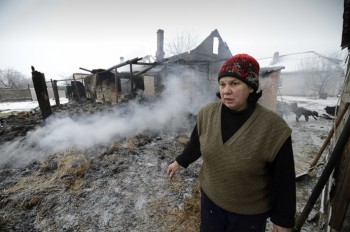
A woman stands by her smoldering home in the Lidievka district, after it was hit and destroyed by shelling in the eastern Ukrainian city of Donetsk on December 6, 2014. (AFP Photo/Eric Feferberg)
HR 758 also calls on Russia “to reverse its illegal annexation of the Crimean peninsula, to end its support of the separatist forces in Crimea, and to remove its military forces from that region other than those operating in strict accordance with its 1997 agreement on the Status and Conditions of the Black Sea Fleet Stationing on the Territory of Ukraine.”
This statement represents the falsification of history in an effort to pursue a political agenda. The people of the Crimean peninsula, under the threat of violence from government forces, independently called for a referendum to decide their sovereign status. Only after Crimea voted – overwhelmingly – to join the Russian Federation did the Russian Duma hold a vote on the issue. The entire process was done according to the dictates of international law.
There are many more such preposterous claims and dangerous demands in HR 758, yet the document has been greeted with a deafening silence in the United States by the corporate-owned media.
“Global security is at stake,” writes Michel Chossudovsky in Veteran News. “This historic vote – which potentially could affect the lives of hundreds of millions of people worldwide– has received virtually no media coverage. A total media blackout prevails.”
PLEASE EXAMINE THE APPENDIX FOR THE ROLL CALL VOTE on H R 758 and identify the criminals and traitors (Democrats voting with the GOP, and proving the “alternative” party is no such thing in anything of importance) that passed this vile piece of legislation.
REGULAR ARTICLE RESUMES HERE
It is the opinion here that the recent upsurge in anti-Russian rhetoric, which is quickly transforming into concrete actions, is not a new phenomenon. Despite the collapse of the Soviet Union, the United States never really shook off its cold war hangover, and moreover, never really wanted to.
A holier-than-thou attitude has permeated the great majority of US think-tank papers over the years, creating a palpable sense of fear towards Russia while sowing the seeds for immense defense sector profits. Newspaper articles since the time of Boris Yeltsin have dripped with condescending, disparaging remarks about Russia, which have worked to create a particular mindset in many Americans towards a country they have most likely never experienced firsthand.
Meanwhile, inside the world of America’s hermetically sealed cauldron of ‘academic Russian studies’ (READ: Sovietology) – a veritable echo chamber where anti-Russian mantras are recited like unthinking prayers – an atmosphere of hostility against Russia has been carefully cultivated for years. There are only a handful of honest US academicians as far as Russia is concerned.

Sevastopol residents at a celebratory show held after the referendum on Crimea’s status. (RIA Novosti/Valeriy Melnikov)
Sevastopol residents at a celebratory show held after the referendum on Crimea’s status. (RIA Novosti/Valeriy Melnikov)
Given this overtly hostile attitude towards all things Russian, it was quite easy for the United States to sell the idea of a dangerous enemy “on the doorstep of NATO” that has some kind of wild desire to recreate an empire.
Yet what country has been steadily encroaching on Russia’s doorstep like a wolf in sheep’s clothing since the end of the Cold War? What country has refused to cooperate with Russia in its missile defense shield in Eastern Europe, thus bringing the continent to the brink of another arms race? What country has over 800 military franchises spanning the globe, yet accuses Russia of yearning for empire? What country has launched military offensives against seven countries in the last six years, yet calls Russia an “aggressive state” because it dares defends itself when attacked by a foreign power? What country has been playing geopolitical games in Ukraine since the collapse of the Soviet Union – even sending high-ranking political figures into central Kiev to spew venomous rhetoric against Russia when it appeared that Ukraine was going to join an economic bloc with Russia, as opposed to the EU?
Before the US Senate votes on HR758, it should ask itself these simple questions, otherwise it risks stirring up a hornet’s nest of problems the world does not need.
 Robert Bridge has worked as a journalist in Russia since 1998. Formerly the editor-in-chief of The Moscow News, Bridge is the author of the book, Midnight in the American Empire, which discusses the dangerous consequences of extreme corporate power in the United States.
Robert Bridge has worked as a journalist in Russia since 1998. Formerly the editor-in-chief of The Moscow News, Bridge is the author of the book, Midnight in the American Empire, which discusses the dangerous consequences of extreme corporate power in the United States.
anti-state•anti-war•pro-market
House Resolution 758: A Work of Fiction
[dropcap]T[/dropcap]he U.S. government is a bastion of reckless behavior, constantly and continually. The extent of damage inflicted upon the American people by U.S. governments is huge and incalculable. The latest addition to its record of recklessness is H.R. 758. This resolution passed the House with 95 percent of the House voting “yea”. The vote was 411 to 10 with 13 not voting.
The text of H.R. 758, passed by the U.S. House of Representatives on Dec. 4, 2014, is here. This resolution is directed against Russia. All quotes below are from H.R. 758.
“H.Res.758 – Strongly condemning the actions of the Russian Federation, under President Vladimir Putin, which has carried out a policy of aggression against neighboring countries aimed at political and economic domination.”
H.R. 758 condemns Russia unjustly, unilaterally, without justification, without evidence, and while ignoring Russia’s actual intentions and actions.
H.R. 758 makes false charges against Russia. False accusations obscure facts and realities. This can only lead to harmful decisions. Basing national policies on fictions can only cause problems and hurt Americans.
H.R. 758 gains nothing for Americans by fabricating false charges against Russia. To the contrary, there is much to be lost by placing America on a collision course with Russia. There is much to be lost for Americans, Russians, and other peoples of the world by isolating Russia and starting a new Cold War.
H.R. 758 makes various calls for action “with the goal of compelling it [Russia]…” These acts, that include “visa bans, targeted asset freezes, sectoral sanctions, and other measures on the Russian Federation and its leadership” are hostile and aggressive.
H.R. 758’s attempt to compel Russia raises the distinct possibility of subsequent further economic, political and military steps that confront Russia and raise the likelihood of war, even nuclear war. These prospects are not counterbalanced by any gains to Americans from compelling Russia.
H.R. 758 demeans Russia. It is scandalously derogatory. It accuses Russia. It places Russia in a docket made by the U.S. It judges Russia. It makes the U.S. government the judge and jury of Russia.
H.R. 758 makes demands of Russia. It demands unrealistic capitulation. It places the U.S. in opposition to Russia when there is nothing to be gained by such opposition and peace is to be lost.
H.R. 758 calls for military actions. It spurns diplomacy.
H.R. 758 is aggressive in tone and nature, needlessly and without right.
H.R. 758 intrudes the U.S. into areas of the world where the U.S. doesn’t belong and has no right being. It intrudes the U.S. government into areas where it has no genuine interest on behalf of the American people.
H.R. 758 is fiction purporting to be fact. As fact, it’s mostly garbage, and harmful, dangerous garbage at that.
H.R. 758 is an extended exercise in baseless Congressional propaganda that teaches the American people false beliefs that can only generate hatred, suspicion and hostility. These strengthen the hand of the American warmongers and war party and obscure the voices for peace.
Although the situation in Ukraine and Russia’s role in it are none of Congress’s (or the House’s) business, measures like H.R. 758 will be used to justify further actions against Russia. For this reason, it’s useful to point out just a few of the many fictional narratives in this document.
What emerges after considering some of these allegations is that H.R. 758 has assembled a laundry list of charges against Russia in order to create the illusion of a substantial indictment. This is analogous to how American prosecutors trump up charges by issuing a stew such as assaulting a police officer, resisting arrest, trafficking, conspiracy to deliver controlled substances, conspiracy to resist arrest, unlawful use of a telephone, ad infinitum. This manner of proceeding is not surprising given the legal backgrounds of many Congressmen and members of their staffs.
FICTION: “…the Russian Federation has subjected Ukraine to a campaign of political, economic, and military aggression for the purpose of establishing its domination over the country and progressively erasing its independence.”
FACT: The Russian Federation did absolutely nothing to initiate Ukraine’s current set of troubles. It did not create a coup d’etat in Ukraine. To the contrary, the U.S. encouraged the coup. Russia never attacked Ukraine militarily with its armed forces. It never made an attempt to take over Ukraine. If it has, where is the evidence of such an invasion? Russia has never sought to erase the independence of Ukraine. To the contrary, it has again and again made efforts to bring peace to that country.
FICTION: “…Russian Federation’s forcible occupation and illegal annexation of Crimea…”
FACT: Russia didn’t forcibly occupy Crimea at any time. Russia never invaded Crimea. Actually, in response to the coup d’etat in Kiev, the Parliament of Crimea adopted a resolution calling for a referendum to secede from Ukraine and its illegitimate government. The referendum was put to the people and passed in a one-sided vote. This resulted in Crimea joining the Russian Federation as a sovereign state.
FICTION: “… the Russian Federation has provided military equipment, training, and other assistance to separatist and paramilitary forces in eastern Ukraine that has resulted in over 4,000 civilian deaths, hundreds of thousands of civilian refugees, and widespread destruction…”
FACT: Whatever assistance was or was not, it did not result in “over 4,000 civilian deaths, hundreds of thousands of civilian refugees, and widespread destruction…” as H.R. 758 says. This cannot be laid at the doorstep solely of either the secessionists or the Russian Federation. It is a consequence of the de-stabilization of Ukraine’s government that catalyzed secession movements and resulted in Ukraine’s going to war to maintain its territory.
FACT: As with Crimea, secessionary forces of eastern Ukraine immediately became active after the coup d’etat in Kiev on February, 25, 2014. (The Donetsk Republic organization actually appeared before the year 2007 when Ukraine banned it.) The coup resulted in activists taking control of municipal buildings and declaring the Federal State of Novorussiya on April 7, 2014. One week later, Ukraine’s interim government declared it would confront the secessionists militarily.
FACT: On May 16, 2014, Ukraine declared that the entire Donetsk People’s Republic, a component of the Federal State of Novorussiya, was a terrorist organization. Consequently, Ukraine sent its military forces against those of the eastern Ukraine secessionists. We know that to re-take territory, Ukraine prosecuted the war in Donbass by bombardments of civilian areas.
FACT: The available evidence on the war in Donbass shows complexity in the forces fighting on the secessionist side. The participation of Russians did occur. However, there is no documentation that has yet been provided by the U.S. of the extent and kinds of assistance by Russians and/or by the Russian Federation to the secessionist forces of the Federal State of Novorussiya.
FICTION: “…the terms of the cease-fire specified in the Minsk Protocol that was signed on September 5, 2014, by representatives of the Government of Ukraine, the Russian Federation, and the Russian-led separatists in the eastern area of Ukraine have been repeatedly violated by the Russian Federation and the separatist forces it supports…”
FACT: The cease-fire has been repeatedly violated by both the Government of Ukraine and separatists. They’ve been fighting over the Donetsk airport. Calling the separatists Russian-led is an attempt to make Russia the author of the secessionist movement, which it is not. Cease-fires often are respites in longer wars as each side arms and regroups. This cease-fire’s lapses, which are none of America’s business anyway, can’t be taken seriously, and certainly not as seriously as H.R. 758 purports to do.
FICTION: “Malaysia Airlines Flight 17, a civilian airliner, was destroyed by a missile fired by Russian-backed separatist forces in eastern Ukraine, resulting in the loss of 298 innocent lives…”
FACT: The causes of the destruction of this airliner have not been yet established. H.R. 758 treats allegations as if they were facts.
FICTION: “…the Russian Federation has used and is continuing to use coercive economic measures, including the manipulation of energy prices and supplies, as well as trade restrictions, to place political and economic pressure on Ukraine…”
FACT: The energy relations among Russia, Russian companies, Ukraine and oligarchs of both countries are complex and not easily understood. They are known to be opaque. There are all sorts of hypotheses about them, but little is actually known. The allegation made in H.R. 758 is unproven.
FICTION: “…the Russian Federation invaded the Republic of Georgia in August 2008…”
FACT: The breakup of the USSR has been followed by some instabilities on Russia’s periphery, especially where there are large Russian populations that come into conflict with other nearby peoples. This characterizes Ukraine and Georgia. In the latter case, Georgia had a breakaway region, South Ossetia. Georgia shelled this region, and that brought in the Russian military to protect the integrity of South Ossetia. A European Union report says that Russia didn’t simply invade Georgia on its own hook. It didn’t initiate an aggression. The attacks by Ukraine on Donbass are a similar case, except that Russia has notably notresponded to protect Novorussiya as it did South Ossetia. It has not introduced a concerted Russian attack.
FICTION: “…the Russian Federation continues to subject the Republic of Georgia to political and military intimidation, economic coercion, and other forms of aggression in an effort to establish its control of the country and to prevent Georgia from establishing closer relations with the European Union and the United States…”
FACT: This charge is sour grapes over the fact that Russia doesn’t want Georgia to join NATO and place missiles and armed forces on its doorstep. Georgia wants to join NATO, thinking that it affords it some protection against Russia.
If the Congress regards Russia’s pressures as “forms of aggression”, what then are its sanctions on Russia? Georgia is no more America’s business than is Ukraine. For the U.S. to condemn Russia over its actions on its periphery makes no more sense than for Russia to condemn the U.S. for its actions in Mexico or the Caribbean. When one major state begins to pressure another major state for its intrusions on smaller states, neither one can justify itself; and the result is often war between the two mastodons.
H.R. 758 is confrontational. It’s a jockeying for power at Russia’s boundaries and elsewhere. The problem with it is that as justification for confrontation it is so patently trumped up and false; and as part of a policy of U.S. expansion and influence, it is so foolish, so counter-productive and so dangerous.
H.R. 758 makes Ukraine into a U.S. ally. It calls for the restoration of Ukraine’s pre-coup borders. To accomplish this, it calls for the U.S. to supply arms, services and training to Ukraine: “…calls on the President to provide the Government of Ukraine with lethal and non-lethal defense articles, services, and training required to effectively defend its territory and sovereignty…”
This makes the U.S. a party to Ukraine’s war against Donbass and even Crimea.
The belief that motivates all of H.R. 758 is that Russia is expansionist and on the move, seeking to take over countries on its periphery. Washington sees Putin and Russia as a new Hitler and Germany. This is the basis of all the trumped up charges and fictions in this document. Washington is constructing a new Hitler for itself, even though the situation is totally different and even though the evidence points in very different directions. To this erroneous belief is added another erroneous idea, which is the notion that to do nothing is to appease Russia. And finally there is a third erroneous idea which is that it’s the mission of the U.S. to fight evil empires all over the world. So, since the U.S. government conceives itself as committed to fighting evil empires and it has found one in Putin’s Russia, it wants to join hands with Ukraine and enter the fight. Ukraine is seen as the new Sudetenland or Czechoslovakia or Austria.
What we have in Washington are people who have been so indoctrinated in an oversimplified history of the world American-style that they cannot see anything but those past situations today, when in fact the situations arising today are considerably different and call for very different responses.
 Reality is far, far different than H.R. 758 suggests. Russia is not an aggressive state. Its moves are defensive. Putin has sought time and again to protect Russian populations on the periphery of the Russian Federation. This is merely housekeeping and tidying up after the dissolution of the USSR. Putin wants respect for Russia and a Russian sphere of influence. He wants ties with Europe, peaceful ties. Putin has not built Russia into a military machine of huge proportions. He has not attacked any country in an outright aggression. There is no evidence, in word or deed, that this is his intent.
Reality is far, far different than H.R. 758 suggests. Russia is not an aggressive state. Its moves are defensive. Putin has sought time and again to protect Russian populations on the periphery of the Russian Federation. This is merely housekeeping and tidying up after the dissolution of the USSR. Putin wants respect for Russia and a Russian sphere of influence. He wants ties with Europe, peaceful ties. Putin has not built Russia into a military machine of huge proportions. He has not attacked any country in an outright aggression. There is no evidence, in word or deed, that this is his intent.
NATO is an aggressive force, as shown in Serbia, Afghanistan and Libya. It is a tool of neo-colonialist European powers. NATO cannot be trusted. Russia’s defensiveness concerning NATO is entirely justified.
America is an aggressively expansionary force, with vast global ambitions, as shown by its attacks on Serbia, Afghanistan, Libya, and Iraq, as shown by its drone wars in other countries like Pakistan and Yemen, as shown by its forces in Somalia and its other commitments in Africa, and as shown by its Pacific pivot and evident antagonism toward Russia. Russia’s defensiveness concerning the U.S. is justified.
H.R. 758 reflects anachronistic thinking, but fighting enemies, real and imagined, has become an entrenched habit of American governments. Congress doesn’t want peace. It doesn’t want to exercise diplomacy. It doesn’t want to recognize a multipolar world and other major powers, not really. Congress wants a new and large outside enemy. Else, why would it be constructing one in the form of Putin and the Russian Federation?
ABOUT THE AUTHOR
§
APPENDIX
H RES 758 2/3 YEA-AND-NAY 4-Dec-2014 11:10 AM
QUESTION: On Motion to Suspend the Rules and Agree, as Amended
BILL TITLE: Strongly condemning the actions of the Russian Federation, under President Vladimir Putin, which has carried out a policy of aggression against neighboring countries aimed at political and economic domination
| YEAS | NAYS | PRES | NV | |
| REPUBLICAN | 222 | 5 | 6 | |
| DEMOCRATIC | 189 | 5 | 7 | |
| INDEPENDENT | ||||
| TOTALS | 411 | 10 | 13 |
—- YEAS 411 —
| Adams Amodei Bachmann Bachus Barber Barletta Barr Barrow (GA) Barton Bass Beatty Becerra Benishek Bentivolio Bera (CA) Bilirakis Bishop (GA) Bishop (NY) Black Blackburn Blumenauer Bonamici Boustany Brady (PA) Brady (TX) Braley (IA) Brat Bridenstine Brooks (AL) Brooks (IN) Broun (GA) Brown (FL) Brownley (CA) Buchanan Bucshon Burgess Bustos Butterfield Byrne Calvert Camp Campbell Capito Capps Cárdenas Carney Carson (IN) Carter Cartwright Cassidy Castor (FL) Castro (TX) Chabot Chaffetz Chu Cicilline Clark (MA) Clarke (NY) Clawson (FL) Clay Cleaver Clyburn Coffman Cohen Cole Collins (GA) Collins (NY) Conaway Connolly Conyers Cook Costa Cotton Courtney Cramer Crawford Crenshaw Crowley Cuellar Culberson Cummings Daines Davis (CA) Davis, Danny Davis, Rodney DeFazio DeGette Delaney DeLauro DelBene Denham Dent DeSantis DesJarlais Deutch Diaz-Balart Dingell Doggett Duffy Duncan (SC) Edwards Ellison Ellmers Engel Enyart Eshoo Esty Farenthold Farr Fattah Fincher Fitzpatrick Fleischmann Fleming Flores Forbes Fortenberry Foster Foxx Frankel (FL) Franks (AZ) Frelinghuysen Fudge Gabbard Garamendi Garcia Gardner Garrett Gerlach Gibbs Gibson Gingrey (GA) Gohmert Goodlatte Gosar Gowdy Granger |
Graves (GA) Graves (MO) Green, Al Green, Gene Griffin (AR) Griffith (VA) Grijalva Grimm Guthrie Gutiérrez Hahn Hanabusa Hanna Harper Harris Hartzler Hastings (WA) Heck (NV) Heck (WA) Hensarling Herrera Beutler Higgins Himes Hinojosa Holding Holt Honda Horsford Hoyer Hudson Huelskamp Huffman Huizenga (MI) Hultgren Hunter Hurt Israel Issa Jackson Lee Jeffries Jenkins Johnson (GA) Johnson (OH) Johnson, E. B. Johnson, Sam Jolly Jordan Joyce Kaptur Keating Kelly (IL) Kelly (PA) Kennedy Kildee Kilmer Kind King (IA) King (NY) Kingston Kinzinger (IL) Kirkpatrick Kline Kuster Labrador LaMalfa Lamborn Lance Langevin Lankford Larsen (WA) Larson (CT) Latham Latta Lee (CA) Levin Lewis Lipinski LoBiondo Loebsack Lofgren Long Lowenthal Lowey Lucas Luetkemeyer Lujan Grisham (NM) Luján, Ben Ray (NM) Lummis Lynch Maffei Maloney, Carolyn Maloney, Sean Marchant Marino Matheson Matsui McAllister McCarthy (CA) McCaul McClintock McCollum McGovern McHenry McIntyre McKeon McKinley McMorris Rodgers McNerney Meehan Meeks Meng Messer Mica Michaud Miller (FL) Miller (MI) Moore Moran Mullin Mulvaney Murphy (FL) Murphy (PA) Nadler Napolitano Neal Neugebauer Noem Nolan Norcross Nugent Nunes Nunnelee Olson Owens Palazzo Pallone Pascrell |
Pastor (AZ) Paulsen Payne Pearce Pelosi Perlmutter Perry Peters (CA) Peters (MI) Peterson Petri Pingree (ME) Pittenger Pitts Pocan Poe (TX) Polis Pompeo Posey Price (GA) Price (NC) Quigley Rahall Rangel Reed Reichert Renacci Ribble Rice (SC) Richmond Rigell Roby Roe (TN) Rogers (AL) Rogers (KY) Rogers (MI) Rokita Rooney Ros-Lehtinen Roskam Ross Rothfus Roybal-Allard Royce Ruiz Runyan Ruppersberger Rush Ryan (OH) Ryan (WI) Salmon Sánchez, Linda T. Sanchez, Loretta Sanford Sarbanes Scalise Schakowsky Schiff Schneider Schock Schrader Schwartz Schweikert Scott (VA) Scott, Austin Scott, David Sensenbrenner Serrano Sessions Sewell (AL) Shea-Porter Sherman Shimkus Shuster Simpson Sinema Sires Slaughter Smith (MO) Smith (NE) Smith (NJ) Smith (TX) Smith (WA) Southerland Speier Stewart Stivers Stockman Stutzman Swalwell (CA) Takano Terry Thompson (CA) Thompson (MS) Thompson (PA) Thornberry Tiberi Tierney Tipton Titus Tonko Tsongas Turner Upton Valadao Van Hollen Vargas Veasey Vela Velázquez Visclosky Wagner Walberg Walden Walorski Walz Wasserman Schultz Waters Waxman Weber (TX) Webster (FL) Welch Wenstrup Westmoreland Whitfield Williams Wilson (FL) Wilson (SC) Wittman Wolf Womack Woodall Yarmuth Yoder Yoho Young (AK) Young (IN) |
—- NAYS 10 —
| Amash Duncan (TN) Grayson Hastings (FL) |
Jones Massie McDermott Miller, George |
O’Rourke Rohrabacher |
—- NOT VOTING 13 —
| Aderholt Bishop (UT) Capuano Coble Cooper |
Doyle Duckworth Gallego Hall McCarthy (NY) |
Meadows Miller, Gary Negrete McLeod |
Other details, including a summary, may be found here.
If you took the time to read this article, and found it worth SHARING, then why not sign up with our special bulletin to be included in our future distributions?
YOUR SUBSCRIPTIONS (SIGNUPS TO THE GREANVILLE POST BULLETIN) ARE COMPLETELY FREE, ALWAYS. AND WE DO NOT SELL OR RENT OUR EMAIL ADDRESS DATABASES—EVER. That’s a guarantee.
